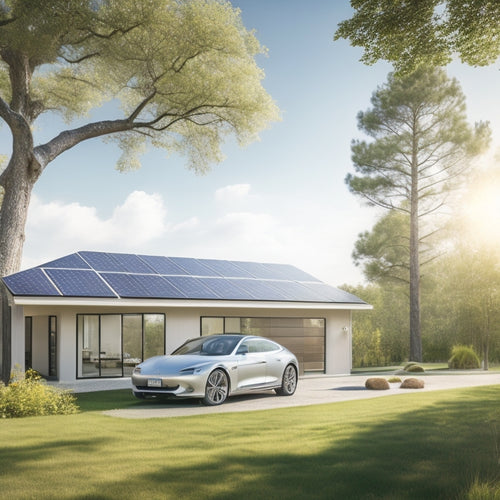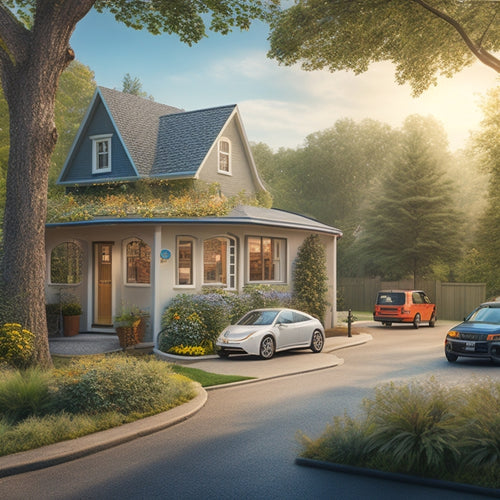
Master Advanced Solar Panel Design Online for Free
Share
You can master advanced solar panel design online for free by leveraging specialized courses and training platforms, which can increase your chances of success in the industry, considering that the International Renewable Energy Agency estimates that solar energy could become the largest source of electricity globally by mid-century. You'll gain skills in photovoltaic system design fundamentals, electrical circuit analysis, and energy conversion principles. You'll learn to optimize system performance, minimize costs, and determine ideal solar panel configuration. As you continue to explore these topics, you'll discover the key to acquiring advanced solar design skills and staying ahead in the evolving solar industry.
Key Takeaways
• Master photovoltaic system design fundamentals through online courses on platforms like Solar Energy International (SEI) and Coursera.
• Grasp electrical circuit analysis and energy conversion principles to optimize system performance and minimize costs.
• Learn about series and parallel connections to determine the ideal solar panel configuration and maximize energy yield.
• Access free online training resources for solar panel design and installation to stay ahead in the evolving solar industry.
• Develop advanced skills in designing for energy efficiency, conducting energy audits, and implementing energy-efficient systems.
Unlocking Advanced Solar Design Skills
To access advanced solar design skills, begin by mastering the fundamentals of photovoltaic system design, including electrical circuit analysis and energy conversion principles.
You'll need a solid grasp of electrical circuits, including series and parallel connections, to create efficient solar panel systems. Understanding energy conversion principles will help you optimize system performance and maximize energy output.
As you develop your skills, stay up-to-date with industry trends and advancements in solar technology. Staying current with industry developments will help you design more efficient and effective solar panel systems.
Consider obtaining solar certifications, such as the North American Board of Certified Energy Practitioners (NABCEP) certification, to demonstrate your expertise and commitment to the field.
Free Online Training Platforms
You can now accelerate your advanced solar design skills by leveraging free online training platforms that offer specialized courses and resources on solar panel design and installation. These platforms bridge the skill gap, providing access to training pathways that were previously inaccessible. By embracing lifelong learning, you can stay ahead of the curve in the rapidly evolving solar industry.
Here are three free online training platforms to get you started:
-
Solar Energy International (SEI): Offers in-depth courses on solar panel design, installation, and maintenance.
-
Coursera's Solar Energy Specialization: Provides a series of courses on solar energy systems, design, and policy.
-
edX's Solar Energy MicroMasters: Covers the fundamentals of solar energy, including system design and installation.
Mastering Solar Panel System Design
As you start mastering solar panel system design, you'll need to grasp the fundamental principles that govern system design. This includes understanding how to optimize system performance, ensuring reliable operation, and minimizing costs.
You'll also need to determine the ideal solar panel configuration, considering factors like panel orientation, tilt, and shading to maximize energy yield.
System Design Principles
Designing an efficient solar panel system requires balancing multiple components, from photovoltaic panels and inverters to mounting structures and electrical connections, which demands a deep understanding of system design principles.
As you explore the world of solar panel design, you'll need to grasp the intricacies of energy flow and load calculations to guarantee a seamless integration of all components.
To achieve peak system performance, you must consider the following key principles:
-
Load calculations: Accurately determine the energy requirements of your system to guarantee it can meet the demands of your load.
-
Energy flow: Understand how energy flows through your system, from the photovoltaic panels to the inverter and eventually to the electrical grid or load.
-
System optimization: Balance the components to maximize energy production while minimizing energy losses and ensuring a safe and reliable operation.
Solar Panel Configuration
By balancing load calculations, energy flow, and system optimization, you've laid the groundwork for a high-performance solar panel system, and now it's time to configure the solar panels themselves to maximize energy production.
The solar panel configuration is a critical aspect of the system design, as it directly impacts the energy yield.
You'll need to contemplate factors such as panel angularity, which affects the amount of sunlight the panels receive. A steeper angle can increase energy production during winter months, while a shallower angle is more suitable for summer.
You'll also need to decide on the panel's orientation, whether it's a fixed or tracking system, and the spacing between panels to minimize shading.
A well-designed solar panel configuration can significantly enhance energy yield. For instance, using a tracking system can increase energy production by up to 45% compared to a fixed system.
Designing for Energy Efficiency
When integrating solar panels into a building's architecture, you must carefully balance energy production with energy consumption to maximize overall energy efficiency. This requires a holistic approach, considering not only the solar panel system but also the building's overall energy usage.
To achieve peak energy efficiency, consider the following:
-
Conduct an energy audit: Identify areas of energy inefficiency in the building and prioritize improvements. This will help you optimize energy consumption and reduce the load on your solar panel system.
-
Fine-tune the building envelope: Ensure the building's walls, windows, and insulation are designed to minimize heat gain and loss, reducing the need for heating and cooling.
-
Implement energy-efficient systems: Incorporate energy-efficient lighting, HVAC, and appliances to reduce energy consumption and maximize the impact of your solar panel system.
Advanced Solar Panel Installation Techniques
You'll need to utilize advanced solar panel installation techniques to guarantee maximum energy harvesting, including meticulous consideration of panel angle, orientation, and spacing to maximize energy production.
As you plan your installation, consider the roof orientation, as it has a substantial impact on energy output. A south-facing roof with a slope between 15 and 40 degrees is ideal, but you can still achieve excellent results with adjustments to panel angle and orientation.
Structural integrity is also vital, as it ensures the solar panels can withstand environmental factors like wind, snow, and hail. Ensure the roof can support the weight of the panels and that the mounting system is securely fastened.
Additionally, consider the shading effects of nearby objects, such as trees or buildings, and plan your installation accordingly. By meticulously considering these factors, you can maximize your energy output and get the most out of your solar panel system.
With advanced installation techniques, you can harness the full potential of solar energy and power your home or business efficiently.
Building a Successful Solar Career
As you master advanced solar panel installation techniques, you're well-positioned to build a successful solar career, leveraging your expertise to drive growth in this rapidly expanding industry.
To propel your career forward, focus on the following key strategies:
- Industry Networking:
- Attend industry conferences
- Join solar-related organizations
- Connect with professionals on LinkedIn
- Expand your network and stay updated on the latest developments.
- Professional Mentorship:
- Seek guidance from experienced solar professionals
- Obtain valuable insights, advice, and support to help you navigate the industry.
- Continuous Learning:
- Stay up-to-date with the latest solar technologies, policies, and best practices
- Engage in online courses, webinars, and workshops
- Ensure your skills remain relevant and in-demand.
Frequently Asked Questions
Can I Design Solar Panels Without Prior Electrical Engineering Experience?
As a solar newbie, you can still design solar panels without prior electrical engineering experience by grasping design basics, such as understanding voltage, current, and power calculations, and learning about panel configuration and installation requirements.
Are Online Certifications Recognized by the Solar Industry?
As you navigate the solar industry, you're right to wonder: are online certifications recognized? Yes, many industry-recognized certifications, such as NABCEP, guarantee professional credibility, meeting industry standards, and regulatory compliance, reflecting the quality of your training.
How Long Does It Take to Master Advanced Solar Panel Design?
You'll spend around 3-6 months mastering advanced solar panel design, depending on your learning curve; expect a steep design timeline, but with dedication, you'll conquer complex systems and optimize energy output in no time.
Can I Use Free Online Training for Commercial Solar Projects?
'You're about to catapult your solar ambitions into orbit! With free online training, you can scale commercial projects with confidence, meeting industry standards for peak performance, ensuring seamless integration and maximum ROI.'
Do I Need to Purchase Special Software for Solar Panel Design?
You'll likely need specialized software for commercial solar projects, but costs vary widely; consider open-source options for design flexibility, weighing software costs against your project's specific needs and desired level of customization.
Related Posts
-

Why Invest in Solar Car Battery Chargers Online?
By investing in a solar car battery charger online, you're not only reducing your reliance on fossil fuels but also o...
-

Why Nearby EV Conversion Shops Matter to You
Having a nearby EV conversion shop means you'll experience the benefits of a more personalized, convenient, and susta...
-

What You Need to Know About Permits and Inspections
You need to navigate the complex landscape of permits and inspections to guarantee your project complies with local z...


